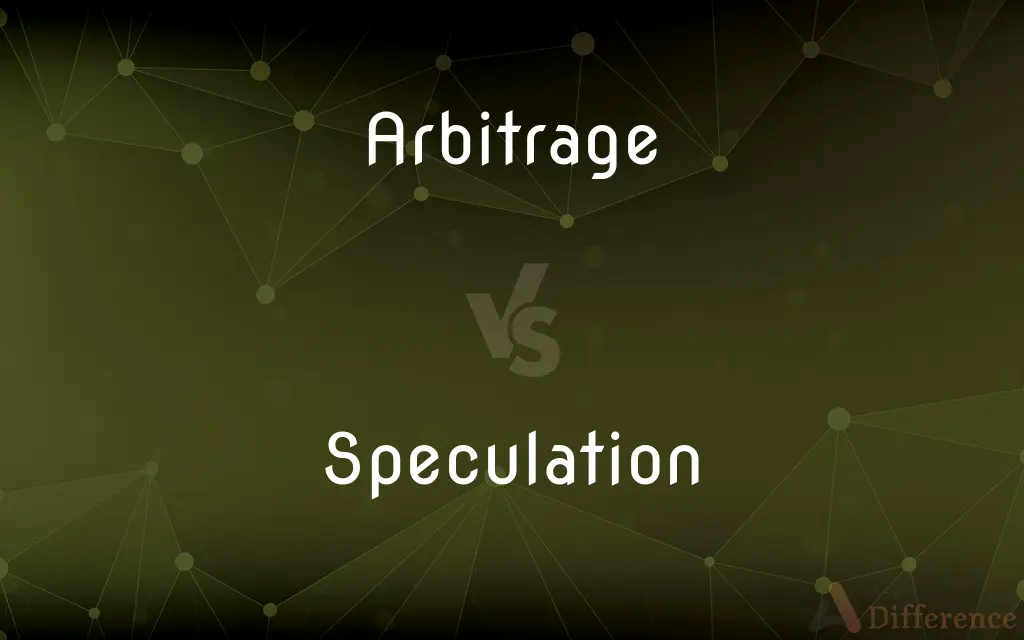Arbitrage vs. Speculation — What's the Difference?
By Tayyaba Rehman — Updated on October 26, 2023
Arbitrage is exploiting price differences in different markets for the same asset. Speculation is investing based on anticipated future price movements, accepting risk.

Difference Between Arbitrage and Speculation
Table of Contents
ADVERTISEMENT
Key Differences
Arbitrage is a financial strategy that involves buying and selling the same asset simultaneously in different markets to exploit price discrepancies. Speculation, conversely, is the practice of making investments based on anticipated future price movements, often without a guaranteed return.
While Arbitrage seeks to take advantage of momentary price differences across various markets and is usually considered a risk-free profit, Speculation inherently involves a higher level of risk. Speculators bet on the future direction of asset prices, accepting the possibility of losses.
Arbitrage opportunities generally arise from inefficiencies in the market and tend to close quickly as traders exploit them. In essence, arbitrageurs help markets maintain price efficiency. Speculation, on the other hand, is driven by investor perceptions, beliefs, and expectations about future events or market movements.
The primary objective of Arbitrage is to achieve a guaranteed profit from existing price disparities, making it relatively low risk. However, Speculation aims to capitalize on potential future price changes, making it a strategy that can yield high rewards or significant losses.
Both Arbitrage and Speculation play crucial roles in the financial markets. While arbitrageurs ensure price consistency across different markets, speculators provide liquidity and can influence price discovery based on their collective outlook on asset values.
ADVERTISEMENT
Comparison Chart
Nature
Exploiting existing price differences
Betting on potential future price changes
Risk Level
Typically low risk
High risk
Purpose
Achieve almost guaranteed profit
Potential high rewards or losses
Market Impact
Contributes to market efficiency
Influences price discovery
Time Horizon
Short-term (immediate)
Can be short-term or long-term
Compare with Definitions
Arbitrage
The act of exploiting the price difference between identical or similar financial instruments on different markets.
The firm specialized in arbitrage opportunities within the commodities sector.
Speculation
The act of investing in assets with the hope of significant return based on future price movements.
The rise in housing prices led to rampant speculation in real estate.
Arbitrage
A risk-free profit resulting from price differences for the same asset.
The rapid advancement in technology has made pure arbitrage opportunities scarce.
Speculation
Engaging in risky financial transactions with the potential for large profits.
Day traders often indulge in speculation by betting on stock price movements within short timeframes.
Arbitrage
The simultaneous buying and selling of securities in different markets to take advantage of differing prices.
Traders found an arbitrage opportunity when gold prices varied between two exchanges.
Speculation
A financial strategy that accepts the possibility of losing the entire investment in exchange for potential high returns.
The tech start-up industry attracts many speculation investors hoping for the next big success.
Arbitrage
A strategy to exploit short-lived price discrepancies between related financial instruments.
He engaged in arbitrage by purchasing stocks in one country and selling corresponding futures in another.
Speculation
Speculation is the purchase of an asset (a commodity, goods, or real estate) with the hope that it will become more valuable in the near future. In finance, speculation is also the practice of engaging in risky financial transactions in an attempt to profit from short term fluctuations in the market value of a tradable financial instrument—rather than attempting to profit from the underlying financial attributes embodied in the instrument such as value addition, return on investment, or dividends.
Arbitrage
In economics and finance, arbitrage (, UK also ) is the practice of taking advantage of a price difference between two or more markets: striking a combination of matching deals that capitalize upon the imbalance, the profit being the difference between the market prices at which the unit is traded. When used by academics, an arbitrage is a transaction that involves no negative cash flow at any probabilistic or temporal state and a positive cash flow in at least one state; in simple terms, it is the possibility of a risk-free profit after transaction costs.
Speculation
Reasoning based on inconclusive evidence; conjecture or supposition.
Arbitrage
The simultaneous buying and selling of securities, currency, or commodities in different markets or in derivative forms in order to take advantage of differing prices for the same asset
Profitable arbitrage opportunities
Speculation
A conclusion, opinion, or theory reached by conjecture.
Arbitrage
Buy and sell assets using arbitrage
Much of the short selling was being done by people who were arbitraging between the bond and the equity market
Speculation
(Archaic) Contemplation or consideration of a subject; meditation.
Arbitrage
The simultaneous purchase and sale of equivalent assets or of the same asset in multiple markets in order to exploit a temporary discrepancy in prices.
Speculation
Engagement in risky business transactions on the chance of quick or considerable profit.
Arbitrage
To be involved in arbitrage.
Speculation
A commercial or financial transaction involving speculation.
Arbitrage
(finance) A market activity in which a security, commodity, currency or other tradable item is bought in one market and sold simultaneously in another, in order to profit from price differences between the markets.
Speculation
(obsolete) The faculty of sight.
Arbitrage
(archaic) Arbitration.
Speculation
(obsolete) An act of looking at something; examination, observation.
Arbitrage
To employ arbitrage
Speculation
The process of thinking or meditating on a subject.
Arbitrage
To engage in arbitrage in, between, or among
Speculation
(philosophy) The act or process of reasoning a priori from premises given or assumed.
Arbitrage
Judgment by an arbiter; authoritative determination.
Speculation
A conclusion to which the mind comes by speculating; mere theory; notion; conjecture.
Arbitrage
A traffic in bills of exchange (see Arbitration of Exchange).
Speculation
An investment involving higher-than-normal risk in order to obtain a higher-than-normal return.
Arbitrage
The simultaneous or near simultaneous purchase and sale of the same or closely linked securities or commodities in different markets to make a profit on the (often small) differences in price.
Speculation
The act or practice of buying land, goods, shares, etc., in expectation of selling at a higher price, or of selling with the expectation of repurchasing at a lower price; a trading on anticipated fluctuations in price, as distinguished from trading in which the profit expected is the difference between the retail and wholesale prices, or the difference of price in different markets.
Arbitrage
A kind of hedged investment meant to capture slight differences in price; when there is a difference in the price of something on two different markets the arbitrageur simultaneously buys at the lower price and sells at the higher price
Speculation
A card game in which the players buy from one another trumps or whole hands, upon a chance of getting the highest trump dealt, which entitles the holder to the pool of stakes.
Arbitrage
Practice arbitrage, as in the stock market
Speculation
(programming) The process of anticipating which branch of code will be chosen and executing it in advance.
Arbitrage
Capitalizing on the price difference of an asset in different markets without net cash investment.
Currency arbitrage involves buying and selling currencies to benefit from exchange rate discrepancies.
Speculation
The act of speculating.
Speculation
Examination by the eye; view.
Speculation
A conclusion to which the mind comes by speculating; mere theory; view; notion; conjecture.
From him Socrates derived the principles of morality, and most part of his natural speculations.
To his speculations on these subjects he gave the lofty name of the "Oracles of Reason."
Speculation
Mental view of anything in its various aspects and relations; contemplation; intellectual examination.
Thenceforth to speculations high or deepI turned my thoughts.
Speculation
Power of sight.
Thou hast no speculation in those eyes.
Speculation
The act or process of reasoning a priori from premises given or assumed.
Speculation
A game at cards in which the players buy from one another trumps or whole hands, upon a chance of getting the highest trump dealt, which entitles the holder to the pool of stakes.
Speculation
The act or practice of buying land, goods, shares, etc., in expectation of selling at a higher price, or of selling with the expectation of repurchasing at a lower price; a trading on anticipated fluctuations in price, as distinguished from trading in which the profit expected is the difference between the retail and wholesale prices, or the difference of price in different markets.
Sudden fortunes, indeed, are sometimes made in such places, by what is called the trade of speculation.
Speculation, while confined within moderate limits, is the agent for equalizing supply and demand, and rendering the fluctuations of price less sudden and abrupt than they would otherwise be.
Speculation
Any business venture in involving unusual risks, with a chance for large profits.
Speculation
A message expressing an opinion based on incomplete evidence
Speculation
A hypothesis that has been formed by speculating or conjecturing (usually with little hard evidence);
Speculations about the outcome of the election
He dismissed it as mere conjecture
Speculation
An investment that is very risky but could yield great profits;
He knew the stock was a speculation when he bought it
Speculation
Continuous and profound contemplation or musing on a subject or series of subjects of a deep or abstruse nature;
The habit of meditation is the basis for all real knowledge
Speculation
Making financial decisions based on predictions rather than intrinsic value.
The cryptocurrency market is known for its high levels of speculation.
Speculation
Investment based on anticipated market behaviors or trends, not on the asset's current value.
There's speculation that green energy stocks will soar due to increasing environmental concerns.
Common Curiosities
What is the key difference between Arbitrage and Speculation?
Arbitrage involves exploiting existing price differences, while Speculation bets on potential future price movements.
Which strategy has the potential for higher returns, Arbitrage or Speculation?
Speculation generally has the potential for higher returns but also comes with higher risks.
Are speculators always profit-seeking?
While the goal of Speculation is often profit, it's possible for speculators to incur losses due to market unpredictability.
How does Arbitrage contribute to the market?
Arbitrage helps maintain price consistency across markets and contributes to market efficiency.
What drives Speculation in markets?
Speculation is often driven by investor perceptions, beliefs, news, and expectations about future events.
Can Arbitrage opportunities last long?
Arbitrage opportunities are usually short-lived as market participants quickly exploit them, restoring price equilibrium.
What tools do arbitrageurs typically use?
Arbitrageurs often use advanced technology and algorithms to identify and act on Arbitrage opportunities swiftly.
Are Arbitrage opportunities common?
With modern technology and efficient markets, pure Arbitrage opportunities have become rarer.
Is Arbitrage legal?
Yes, Arbitrage is legal, though certain forms can be scrutinized if they manipulate the market.
Can Speculation lead to market bubbles?
Yes, excessive Speculation can sometimes lead to market bubbles, where asset prices rise far above their intrinsic value.
Is Arbitrage risk-free?
Typically, Arbitrage is considered low risk, but it's not entirely risk-free due to potential execution or operational risks.
Can Speculation stabilize markets?
Speculation can provide liquidity, aiding in price discovery, but excessive speculation can also cause price volatility.
Is Arbitrage limited to financial markets?
While commonly associated with financial markets, Arbitrage can occur in any market with price discrepancies.
Does Speculation always involve stocks and securities?
No, Speculation can involve any asset, including real estate, commodities, or currencies.
Share Your Discovery

Previous Comparison
Postman vs. Postwoman
Next Comparison
Symposia vs. SymposiumAuthor Spotlight
Written by
Tayyaba RehmanTayyaba Rehman is a distinguished writer, currently serving as a primary contributor to askdifference.com. As a researcher in semantics and etymology, Tayyaba's passion for the complexity of languages and their distinctions has found a perfect home on the platform. Tayyaba delves into the intricacies of language, distinguishing between commonly confused words and phrases, thereby providing clarity for readers worldwide.














































